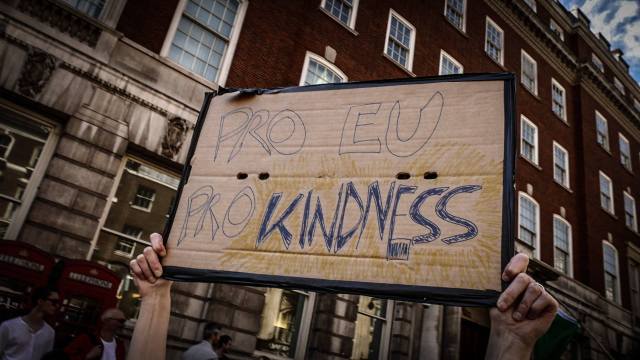Credit: NurPhoto/SIPA USA/PA Images

John Harris is a man of the left. He’s also strongly opposed to Brexit – and I think it safe to say he’s no fan of Donald Trump either.
However, in a brave and brilliant column for the Guardian he doesn’t go after the easy targets, but for the cultural elite he’s theoretically part of:
“Back in 2016, it was briefly fashionable to feign interest in at least some of the places that voted for Brexit and Trump and argue that people with so-called progressive politics ought to think about their problems. But in some quarters, the ‘in’ thing is now a sour, dismissive attitude to millions of people and their supposed complaints. The underlying worldview is simple: whatever the economic context, one part of society is seen as racist, stupid, nostalgic, and brimming with senseless emotion, while another is logical, enlightened and forward-thinking and, despite the fact that the era of alleged rationalism that has now been overturned brought us such disasters as the Iraq war and a huge economic crash, the modern nightmare boils down to the fact that the first group are suddenly in charge.”
Of course, the idea that the cultural outgroup is now running the show is absurd. In Britain, both the governing party and the main opposition party are dominated by members of Parliament who campaigned to stay in the EU. As for the EU itself, the Euro-establishment is firmly in control – both at a federal and a national level.
As for America, the Trump administration is a government of billionaires acting for billionaires.
Beyond politics, every locus of power and influence, whether in business, finance, the arts, academia, the media, and so on, is controlled by exactly the same kind of people as before.
In that respect, nothing has changed.
Which is why the elites have been able to drop their “feigned interest” in the people and places that dared to vote contrary to wishes of the establishment.
As for “senseless emotion”, that’s a rather dangerous thread to be pulling on. Consider the metropolitan liberals who dealt Theresa May a near-fatal blow in the 2017 general election. By depriving her of a majority they greatly increased the vulnerability of a remain-voting Prime minister to Brexit hardliners; and by handing Jeremy Corbyn a moral victory, they greatly weakened the position of moderates in the Labour Party.
Of course, they were fully entitled to express their rage over Brexit at the ballot box – but the practical consequences leave them in a weak position to accuse others of irrationality. (Ditto the sentimentalists who picked the worst possible candidate to take on Donald Trump in 2016.)
Clothed in fashionable garb, even the uttermost lunacy can go about in polite society. In various guises from Marxism to social Darwinism to Freudian psychoanalysis, there’s always been a lot of that in progressive circles. At the current moment in time, Harris sees the prejudices of the elites dressed up in the liberal optimism of Steven Pinker:
“The Harvard psychology professor Steven Pinker has just published Enlightenment Now, a doorstep-sized statement of the case for ‘reason, science, humanism and progress’ against what he calls ‘progressophobia.’”
Therefore, if populists are making headway it is because they have fooled ignorant progessophobes:
“Pinker’s book evokes the same liberal misanthropy now swirling around Brexit. ‘Most voters are ignorant not just of current policy options, but basic facts,’ he says. And woe betide anyone who publicly questions the idea that progress is continuing apace, and no fundamental rethinks are required. ‘I believe that the media and intelligentsia were complicit in populists’ depiction of modern western nations as so unjust and dysfunctional that nothing short of a radical lurch could improve them,’ he says, seemingly ignoring the fact that 10 years after the crash there is still rather a lot of injustice and dysfunction around.”
As I’ve said before, the ‘New Optimists’ get a lot of things right. Across the world we do indeed see massive progress against poverty, disease, illiteracy and all manner of other ills. Though most of that comes from the global deployment of advances that the West made decades ago, we should be grateful for it.
But if the rest of the world is catching up with us, it’s also because we’ve had at least a generation of standing still – and for many people, going backwards:
“It may fly in the face of the boundless optimism proffered by Pinker, but in a lot of these places, in terms of basic security and a collective belief in the future, life was probably better 40 or 50 years ago.”
Advances like smartphones don’t even begin to make up for the collapse of family, community and the dignity of a respected role in life.
Despite visible symptoms like the opioid epidemic in the US, the liberal elites just can’t admit that something is terribly wrong – let alone do anything about it.
“In Britain and elsewhere, the liberal left has still not found the language to speak to that sense of loss. Even now, a lot of the people who feel it see Brexit as the better of two options: the continuation of the way things were before, or a chance to at least upturn the tables, bring decision-making much closer to home and somehow start again.”
“I feel your pain”, said the first and only President Clinton.
“Feel mine!” say his liberal successors.










Join the discussion
Join like minded readers that support our journalism by becoming a paid subscriber
To join the discussion in the comments, become a paid subscriber.
Join like minded readers that support our journalism, read unlimited articles and enjoy other subscriber-only benefits.
Subscribe